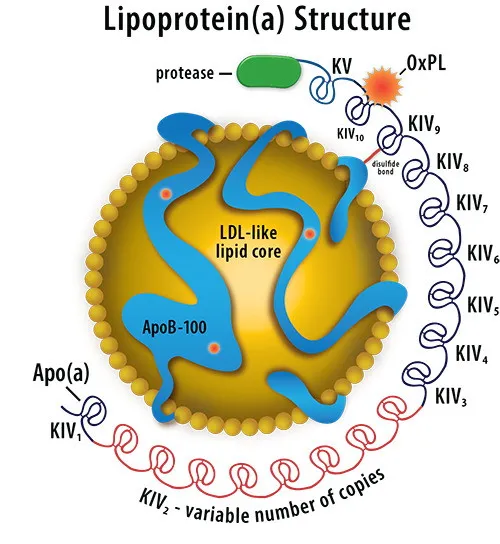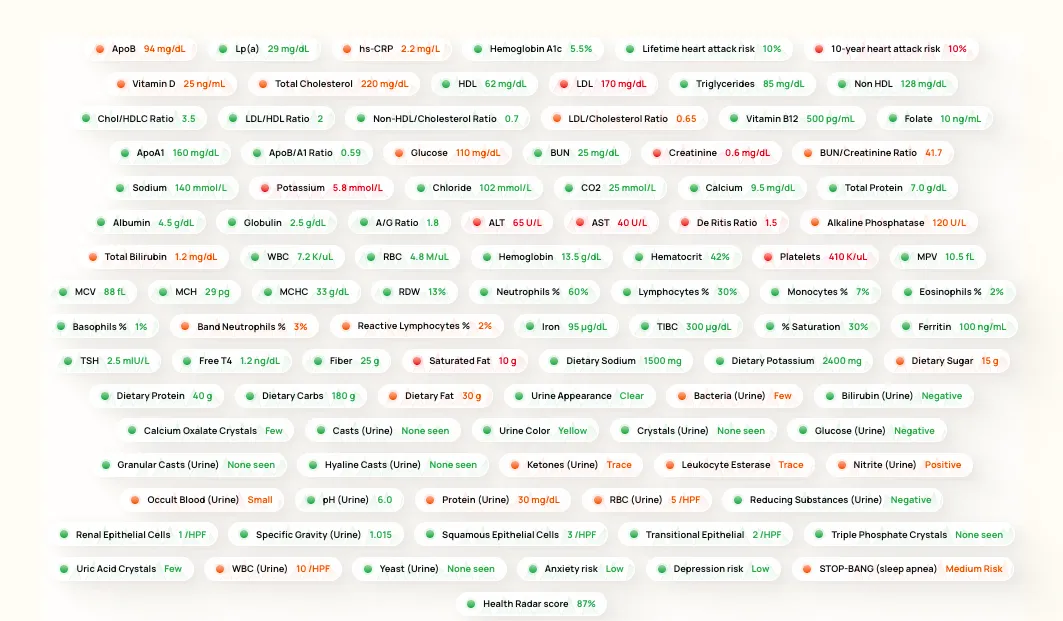According to Peter Attia, if you could only measure two biomarkers for heart health, they’d be ApoB and Lp(a). These tests are also known as Apolipoprotein B and Lipoprotein (a).
Both ApoB and Lp(a) are advanced biomarkers that predict heart disease risk better than traditional cholesterol tests. But they measure fundamentally different things. Understanding the difference between ApoB and Lp(a) could save your life.
ApoB: a more accurate LDL cholesterol
Apolipoprotein B, or ApoB, directly counts the number of atherogenic particles in your blood. Each particle that can cause heart disease (LDL, VLDL, IDL) contains exactly one ApoB molecule. ApoB is more accurate than LDL cholesterol since LDL measures the mass of cholesterol in those particles, and also misses VLDL and IDL.
Think of it this way: if LDL cholesterol is like measuring the weight of cars on a highway, ApoB counts the actual number of cars. ApoB tells you how many particles are trying to penetrate your artery walls and cause plaque buildup.
Every 10 mg/dL drop in ApoB cuts your heart disease risk by about 9%. It’s possible to lower ApoB naturally or through medication.
Lp(a): your hereditary heart disease risk
Elevated Lipoprotein(a) (Lp(a)) is the single strongest inherited risk factor for heart disease. Your Lp(a) levels are largely set at birth.
Each Lp(a) particle is essentially a regular LDL particle with an additional protein, apoprotein (a), that “camoflauges” the whole particle from your liver. This “camoflauge” makes Lp(a) particle is about 6x more atherogenic than regular LDL.
 Each Lipoprotein(a) contains ApoB, plus an apoprotein (a) protein which camoflauges the the whole structure from your liver
Each Lipoprotein(a) contains ApoB, plus an apoprotein (a) protein which camoflauges the the whole structure from your liver
This is why Lp(a) is crucial for understanding your genetic risk. If you have high Lp(a), you might need more aggressive interventions (like statins to lower ApoB) earlier in life.
The difference between apolipoprotein b and lipoprotein a
ApoB tells you about your current lifestyle-driven risk. Lp(a) tells you about your genetic baseline. Together, they give you a complete picture of your heart disease risk.
A great heart health blood test includes both ApoB and Lp(a)
Most standard cholesterol panels only measure LDL and HDL. If you want to truly understand your heart health, you need a advanced biomarkers like ApoB and Lp(a). In addition, we recommend looking at:
- Inflammation (hs-CRP)
- ApoB/ApoA1 ratio
- Nutrients such as potassium, sodium, and calcium
- Complete cell counts
How to get a blood test with ApoB and Lp(a) for under $200

Empirical’s comprehensive heart health panel includes both ApoB and Lp(a), along with 90+ other biomarkers including inflammation (hs-CRP), traditional lipids, and more for $190.
Get your comprehensive heart health panel today
Get your free 30-day heart health guide
Evidence-based steps to optimize your heart health.
